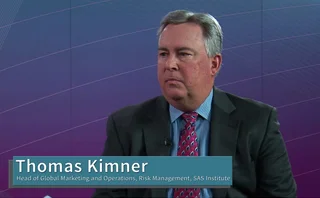
No strings attached
The M&A crowd wave

No doubt you've heard the phrase 'wave of M&A deals'. It's an apt expression, particularly when the word 'wave' refers to a crowd wave at a sporting event. In a crowd wave, you know when it's your turn to stand up and fling your arms in the air when the guy sitting next to you does it. Such behavior would look slightly ridiculous if you were to indulge in it alone but when everyone's doing it, it takes on an orchestrated quality that gives it purpose and is highly amusing.
And so it is with M&A. Deals beget deals. You know it's your turn to go and buy one of your smaller competitors when one of your bigger competitors does it. You always have the option not to of course. There are enough examples of deals that stumbled out of the starting blocks for us all to know that bigger isn't necessarily better.
But in the US, many company strategies have a shelf life only slightly longer than that of perishable food, and there are few things more feared than being left behind by the latest trend. Refuse to play the game and the M&A 'wave' could soon be your competitors waving goodbye as they depart for a world of higher earning multiples and buoyant stock prices leaving you in their wake. No one likes the guy who won't stand up for a crowd wave.
There are less spurious reasons why M&A tends to be so cyclical and 2004 bears all the hallmarks of a year in which deal growth will be substantial. Last year's stock market rally restored equity as a viable purchase currency and stabilized credit quality, removing some of the rating risk often associated with M&A announcements. The leveraged buyout funds are flush with cash. After three years of cost cutting, balance sheets are healthier. And robust economic growth forecasts are fostering the kind of optimism that is an essential ingredient in the wave recipe.
Management teams that are huddled in the bunker fighting falling demand and vanishing margins aren't typically of a mindset to add a little increased business risk to the mix by making acquisitions.
That being said, however, the constrained organic growth prospects that afflict many industries despite the economic upswing will be a key driver of deal opportunities; consolidation is a classic strategy in mature businesses. There is only limited potential for the merger-oftitans, transformational deals that abounded in the late 1990s, but there will be some big numbers hitting the headlines with the finance sector likely to generate many of them. Bank of America's $47 billion acquisition of FleetBoston last year has thrown down the gauntlet to other top banks looking to expand their regional footprint. The first response was January's $58 billion merger between JPMorgan and Bank One; others are likely to follow.
All this is good news for the brokerage houses and investment banks that dominate the M&A league tables, and advisory fees should feature heavily in their earnings in the coming year. And each deal completed at improved credit multiples will provide another data point confirming the recovery in credit quality that has already been factored into security prices.
However, the best news for bondholders is that the restraint that has been shown to date with regard to levering up to do deals should provide bondholders with a high degree of comfort that they will not be the losers in the game.
Louise Purtle is corporate strategist at research provider CreditSights
Only users who have a paid subscription or are part of a corporate subscription are able to print or copy content.
To access these options, along with all other subscription benefits, please contact info@risk.net or view our subscription options here: http://subscriptions.risk.net/subscribe
You are currently unable to print this content. Please contact info@risk.net to find out more.
You are currently unable to copy this content. Please contact info@risk.net to find out more.
Copyright Infopro Digital Limited. All rights reserved.
As outlined in our terms and conditions, https://www.infopro-digital.com/terms-and-conditions/subscriptions/ (point 2.4), printing is limited to a single copy.
If you would like to purchase additional rights please email info@risk.net
Copyright Infopro Digital Limited. All rights reserved.
You may share this content using our article tools. As outlined in our terms and conditions, https://www.infopro-digital.com/terms-and-conditions/subscriptions/ (clause 2.4), an Authorised User may only make one copy of the materials for their own personal use. You must also comply with the restrictions in clause 2.5.
If you would like to purchase additional rights please email info@risk.net
More on Infrastructure
Communications surveillance solutions 2024: market update
A report offering Chartis’ latest view of the vendor landscape for communications surveillance solutions
SIMONE, the AI that nearly took down a bank
An algorithm designed to create new structured products ran out of control last year with almost catastrophic consequences for a major bank, as our exclusive whistleblower account reveals
Revealed: where banks are (literally) warehousing their swaps
As derivatives notional grows, dealers experiment with novel storage solutions
E-trading takes hold for FX swaps – sort of
Bulk of trades are being executed over screen, but bolder changes have stalled
From DNA to DHA – Preparing for a new era of digital human augmentation
As technology increasingly permeates societies, cultures and everyday activities, its integration into people’s lives is having a profound impact on what is expected of people in the workplace. Deloitte examines this evolution of today’s workforce, the…
Risk and finance: Working more closely together
Video interview: Thomas Kimner, SAS
Video interview: Fabio Merlino, Intesa Sanpaolo
Fabio Merlino, head of retail and insurance risk discusses how the wealth management division of Intesa Sanpaolo upgraded its risk analytics capabilities with the algo system used by its proprietary traders
The changing face of Risk.net and our magazines
Extensive reader consultation has helped us reshape editorial teams and our site







